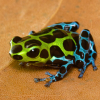Invicta, Longicornis, Argentine... any others?
- Formiculture.com
- Forums
- Gallery
- Members
- Member Map
- Chat

Invicta, Longicornis, Argentine... any others?
Tapinoma sessile.
yep
Tapinoma melanocephalum
Interesting. Never knew F. exsecta made supercolonies.Probably any ant on this list:
http://www.antwiki.o...i/Supercolonies
Thank you!
Interesting. Never knew F. exsecta made supercolonies.Probably any ant on this list:
http://www.antwiki.o...i/Supercolonies
Neither did I. I wonder if they parasitize nests to add territory.
YJK
Edited by Serafine, February 22 2017 - 12:08 AM.
We should respect all forms of consciousness. The body is just a vessel, a mere hull.
Welcome to Lazy Tube - My Camponotus Journal
Edited by AntswerMe, May 5 2017 - 2:50 AM.
We should respect all forms of consciousness. The body is just a vessel, a mere hull.
Welcome to Lazy Tube - My Camponotus Journal
I think many Monomorium species, such as M. minimum and M. emarginatum have been known to exhibit these traits, as well.
Figuring out which species mate inside the nest (or which species accept additional queens) takes more than a thread where everybody rattles off names without adding context or details.
I agree that most ants which are polygynous or polydomous belong on this list, but bear in mind that there are loads of exceptions. Many polygynous species will also be monogynous.
If you've enjoyed using my expertise and identifications, please do not create undue ecological risk by releasing your ants. The environment which we keep our pet insects is alien and oftentimes unsanitary, so ensure that wild populations stay safe by giving your ants the best care you can manage for the rest of their lives, as we must do with any other pet.
Exotic ants are for those who think that vibrant diversity is something you need to pay money to see. It is illegal to transport live ants across state lines.
----
Black lives still matter.
We should respect all forms of consciousness. The body is just a vessel, a mere hull.
Welcome to Lazy Tube - My Camponotus Journal
Figuring out which species mate inside the nest (or which species accept additional queens) takes more than a thread where everybody rattles off names without adding context or details.
I agree 100 %.
Definitely Monomorium, also Cardiocondyla and possibly Brachymymrex.
Owner of :
7 Founding Brachymyrmex Patagonicus queens
Camponotus Nicobarensis.
Edited by AntswerMe, May 14 2017 - 1:20 PM.
Edited by AntswerMe, May 16 2017 - 4:10 AM.
0 members, 0 guests, 0 anonymous users